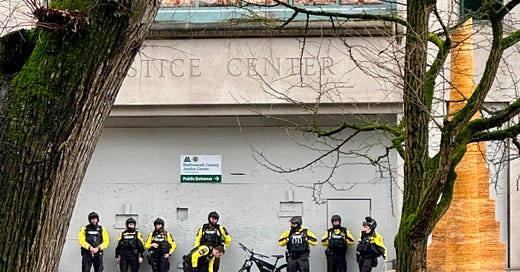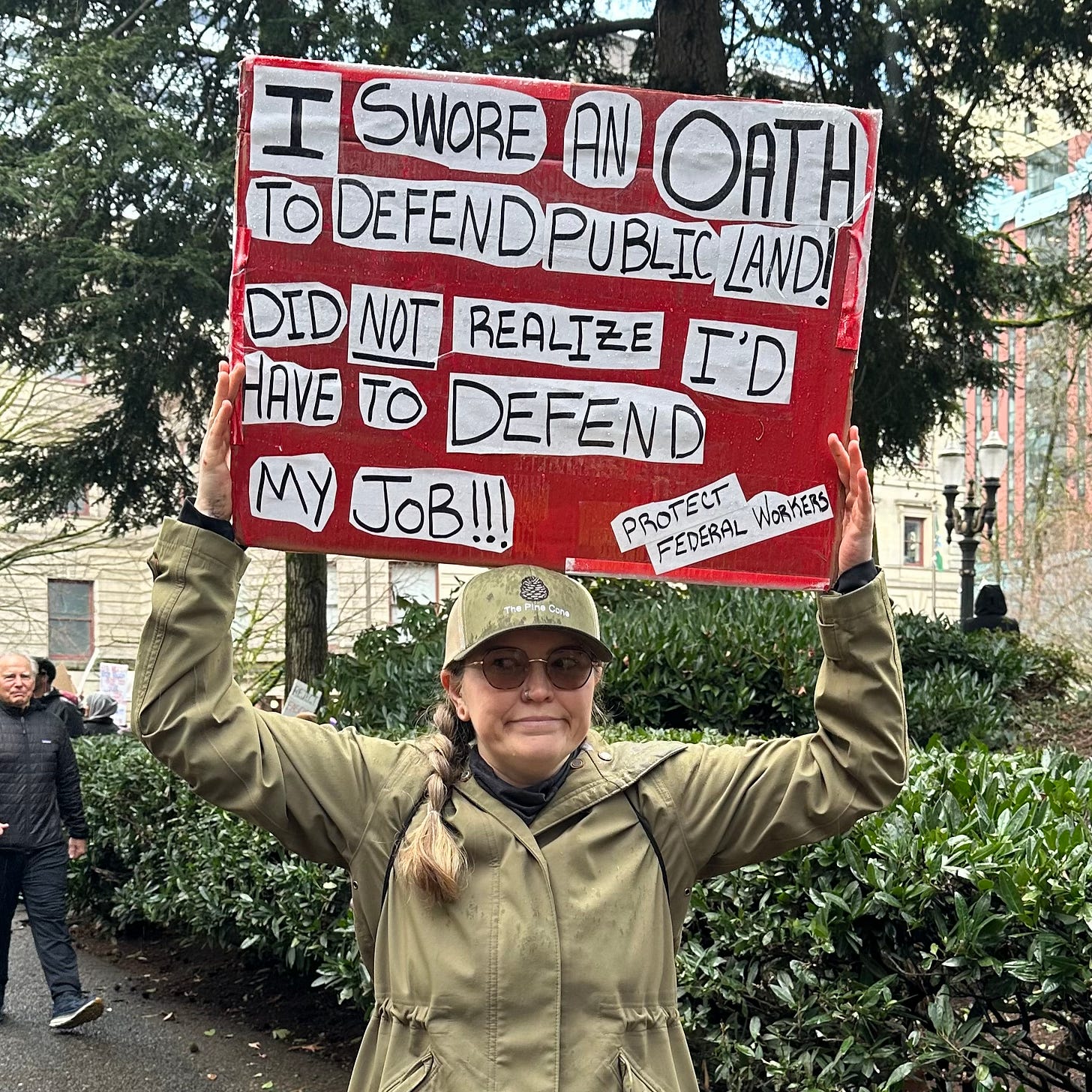Portland Agenda Tracker: Protest, Policing & Public Policy | February 19th & 20th, 2025
From the streets to City Hall: No Kings Day protest, Council to confirm police chief appointment, Joint Terrorism Task Force report, how the County plans to improve shelter referrals, and more!
Dear Readers,
Yesterday, I attended the No Kings Day march at Portland City Hall along with over 1,000 other Portlanders, and I was thrilled to see some of you there! I caught the tail end of the crowd departing City Hall shortly before 1 p.m. The procession was quiet—virtually no chanting or singing at the outset—at least in my leg of the march—and participants, who were overwhelmingly senior citizens, largely obeyed traffic laws as they made their way to the waterfront. From there, marchers crossed the Morrison Bridge, veered onto the Eastbank Esplanade, and looped back over the Hawthorne Bridge. A markedly livelier stream of protesters emerged upon their return—chanting, singing, and dancing their way back to City Hall, a portable DJ booth among them. The atmosphere remained peaceful, with very little interaction with police, who were present but mostly kept their distance, especially once the rain started.
The two groups promoting these protests across the country were 505001 and Indivisible. To say leadership was decentralized is generous; it was virtually nonexistant. There were no scheduled speakers, just occasional amplified encouragement to keep things peaceful. At first, the lack of focus and structure made the gathering feel aimless, but as the crowd swelled across from City Hall, with frequent streams of honks and cheers rising up to add to the energy, I realized that sometimes, the simple act of showing up is enough. Especially in a post-pandemic world, where isolation has taken its toll, being together—connecting, commiserating, and reclaiming public space—can be an act of resistance in itself. At the very least, it feels like the start of something—and we have to start somewhere.
Inside City Hall, business as usual resumes after the holiday. One of the key items on the agenda this week is Council’s confirmation of Robert Day as Portland’s police chief—a move that raises important questions about the future of police reform. The Portland Police Bureau also released its latest Joint Terrorism Task Force (JTTF) report. And at the county level, a briefing on shelter referrals offered insight into how our homelessness response system is working—and could work better.
If I didn’t see you yesterday, I hope to see you out there soon—raising your voice, standing in solidarity, and exercising your right to protest. There will be plenty of opportunities ahead, and I’ll do my best to give you more of a heads-up next time.
With Love & Solidarity,
Chloe
Hello! If you’ve been thinking about becoming a paid subscriber, now’s the time! If money is tight, I encourage you to take advantage of the budget option $3/month or $30/year. If you’re doing alright, I hope you’ll subscribe at the standard rate $6/month or $60/year. And if your finances are out of sight, may I suggest a sustainer-level subscription at $100/year?Portland City Council
📅 Wednesday, February 19th | ⏰6:00PM
Regular Agenda
5: Accept the Portland Police Bureau report to City Council on the 2025 Portland Joint Terrorism Task Force (Report)
The Portland Police Bureau (PPB) has released its latest Joint Terrorism Task Force (JTTF) report, fulfilling the annual reporting requirement established when the city withdrew from full participation in 2019. The report outlines all interactions PPB officers had with the JTTF in 2024. While this is a standard report, it comes amid ongoing scrutiny of local law enforcement’s ties to federal agencies.
In December 2024, the ACLU of Oregon and Don’t Shoot PDX filed public records requests seeking details on how local and federal law enforcement collaborate to monitor activists. Though unrelated to the report’s release, these requests highlight the continued push for transparency.
Key Findings from the 2025 JTTF Report:
No PPB officers were assigned to JTTF investigations in 2024.
The FBI referred three cases to PPB, all investigated and closed with no further action.
PPB referred two cases to the FBI, following local leads.
This limited cooperation reflects Portland’s 2019 withdrawal, driven by concerns over civil rights, lack of oversight, and conflicts with Oregon law. However, the lack of detail about these cases remains a point of contention, with advocates arguing that without transparency, the public cannot assess the risks and benefits of PPB’s ongoing collaboration with the FBI.
Portland’s JTTF History: A Timeline
Portland is the only U.S. city to have twice withdrawn from the JTTF, reflecting an ongoing debate over security vs. civil liberties.
1997 – Portland joins the FBI’s JTTF, embedding local officers alongside federal agents.
2005 – Under Mayor Tom Potter, Portland withdraws, citing oversight and civil rights concerns.
2011 – In response to the 2010 Pioneer Courthouse Square bomb plot, under Mayor Sam Adams, Portland rejoins in a limited capacity, requiring mayoral approval for officer assignments.
2015 – Under Mayor Charlie Hales, Portland fully rejoins, assigning two full-time PPB officers to the JTTF.
2019 – Portland withdraws again, with City Council voting 3-2 to leave, citing FBI secrecy, lack of transparency, and civil rights concerns.
Why Portland Withdrew
Portland’s 2019 withdrawal was led by then-Commissioner Jo Ann Hardesty, with support from civil rights groups, local advocates, Commissioner Amanda Fritz, and me. Concerns included:
Lack of Local Oversight – JTTF operations are classified, making it impossible for city leaders or the public to hold the task force accountable.
Potential Civil Rights Violations – The JTTF has a history of racial and religious profiling, particularly against immigrant and Muslim communities.
Conflicts with Oregon Law – ORS 181A.250 prohibits local law enforcement from collecting information on individuals based on political, religious, or social affiliations without suspicion of a crime—something the FBI does not follow.
Sanctuary City Conflicts – JTTF participation raises concerns about information-sharing with federal agencies that could impact immigration enforcement and racial profiling.
Where Things Stand Today
Portland remains outside the JTTF but collaborates with the FBI when necessary. Supporters of JTTF participation argue that withdrawing limits access to security intelligence, while opponents maintain that full participation undermines local oversight, civil rights, and trust in law enforcement.
Further Reading
Parameters of Cooperation Between Portland Police Bureau and Federal Bureau of Investigation's Joint Terrorism Task Force (City of Portland)
Item 6: Appoint Robert Day as Chief of Police (Resolution)
Note: Robert Day was originally appointeed by Mayor Wheeler, and has been reappointed by Mayor Wilson. As per the new rules, City Council must confirm his appointment. Robert "Bob" Day has spent more than three decades with the Portland Police Bureau, working his way up from patrol officer to leadership roles, including captain of the Training Division and commander of the Central Precinct. In 2018, he was promoted to deputy chief, a position he held until his retirement in 2019.
After retiring, Day remained involved in public safety efforts, including work in the Mayor’s office and with the Red Door Project, a nonprofit focused on police-community dialogue. In September 2023, then-Mayor Ted Wheeler appointed him interim chief of police following Chief Chuck Lovell’s self-demotion. By April 2024, Wheeler made the appointment permanent, citing Day’s experience and ability to manage the department through high crime and officer attrition.
As chief, Day has prioritized crime reduction strategies, particularly around property crime and gun violence, aligning with concerns from business groups and city leaders. While some see him as a steadying presence in the bureau, reform advocates remain skeptical about whether his leadership will bring improved accountability or structural change. His tenure has not introduced major policy shifts, but he has demonstrated a willingness to engage with the public and acknowledge past mistakes—something few past PPB chiefs have been willing to do.
In January 2025, Day issued a formal apology regarding the PPB’s handling of the 2022 Normandale Park shooting. The bureau’s initial public statements mischaracterized the victims as armed protesters, when in reality, they were unarmed traffic safety volunteers. His retraction was a rare act of accountability, particularly for a department that has long resisted external scrutiny. While the apology was a notable step toward accountability, it did little to erase the broader distrust between the PPB and Portland’s activist community.
Inside the PPB, Day is largely respected as a veteran officer who understands the bureau’s culture and internal challenges. In City Hall, he is regarded as a pragmatic leader—not a reformer, but someone capable of keeping the department functional under difficult circumstances. Among police reform advocates, opinions are less enthusiastic as there is little indication that his leadership represents a break from Portland’s traditional policing practices.
Further Reading & Viewing
Big March Planned Downtown Today; Cop Talks "Crowd Control" Philosophy (Portland Mercury)
Who is Bob Day? The incoming interim chief’s history with PPB (KOIN)
Portland’s interim police chief, Robert Day, takes on permanent leadership role (OPB)
Portland police chief formally apologizes to victims, families of Normandale Park mass shooting (KPTV)
📅Wednesday, February 19th | ⏰ 2:00 pm
No Wednesday afternoon session is scheduled.
📅Thursday, February 20th | ⏰ 2:00 pm
Nothing of interest is scheduled for the Thursday afternoon session.Multnomah County Board of Commissioners
📅 Thursday, February 20 | ⏰ 9:30 AM
Regular Agenda
R.2: Shelter Referral Board Briefing
This Board Briefing will address how people experiencing homelessness are referred to shelter and where they come from before entry. The county is working to improve data tracking, reduce barriers to shelter access, and standardize referrals, but gaps remain—especially when it comes to prioritizing geographic preference for those seeking shelter.
A new population dashboard is being developed to provide a clearer picture of the number of unsheltered people and where they are. The most recent count (January 2024) shows 5,394 people living outside. A recent pilot study tracking 465 shelter entries found that 69% were unsheltered before entering a shelter, with most staying in tents, vehicles, or directly on the street.
Shelter referrals vary by system. Families, youth, and domestic violence survivors have clearer pathways and some consideration for location (such as staying near work, school, or support networks). Adults, however, are usually placed wherever a bed is available, regardless of distance from their previous location. The pilot study found that people were often placed miles away from where they were last staying, making it harder to stay connected to jobs, services, or communities.
The county is reviewing its referral process to remove barriers, improve accessibility, and make placements more equitable. But for now, getting into a shelter remains a challenge—both in availability and finding a placement that meets people’s needs without uprooting them entirely.
Metro Council
📅 Thursday, February 20 | ⏰ 10:30 AM
Nothing of interest is scheduled for this week's Metro session.Wonk Out!
No Kings Day Protest in Portland!
‘No kings on Presidents Day’ rings out from protests against Trump and Musk (OPB)
I went to the No Kings Protest in Portland. Here's My Takeaway. (Parkrose Permaculture)
Why Do We Have Joint Terrorism Task Forces?
What is a JTTF? (ACLU)
Disrupt, Discredit and Divide: How the New FBI Damages Democracy by Mike German (Free Press)
Police Reform is Possible
Campaign Zero advocates for data-driven policy reforms to eliminate police violence and improve accountability in law enforcement.
The Vera Institute works to end mass incarceration and transform the criminal legal system through research-driven, evidence-based policy solutions.
The National Police Accountability Project (NPAP) supports legal efforts to hold police accountable for misconduct, providing resources and advocacy for victims of excessive force and civil rights violations.
NYU Policing Project focuses on proactive police accountability, using litigation, policy development, and initiatives like 30×30 to address gender disparities in law enforcement.
Homelessness in Portland and Beyond
Portland Mayor Keith Wilson has a lot to say about homelessness. It’s not all true (Oregonian)
US saw dramatic rise in homelessness at start of 2024, housing agency says (The Guardian)
Portland Homeless Camp Sweeps: Addressing the Crisis and Exploring Long-Term Solutions (Homeless No More)





